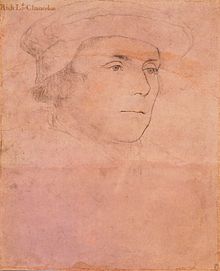Sir Richard Rich
|
The Right Honourable The Lord Rich Kt |
|
|---|---|
 |
|
| Speaker of the House of Commons | |
|
In office 9 June 1536 – 18 July 1536 |
|
| Preceded by | Humphrey Wingfield |
| Succeeded by | Nicholas Hare |
| Lord Chancellor | |
|
In office 1547–1552 |
|
| Preceded by | The Lord St John |
| Succeeded by | Thomas Goodrich |
| Personal details | |
| Born | July 1496 |
| Died | 12 June 1567 (aged 70–71) Rochford, Essex |
| Occupation | Lord Chancellor of England |
Richard Rich, 1st Baron Rich (1496/7 – 12 June 1567), was Lord Chancellor during the reign of King Edward VI of England from 1547 until January 1552. He was the founder of Felsted School with its associated alms houses in Essex in 1564. He was a beneficiary of suppression of the monasteries, and a persecutor and sometimes torturer of those opposed to the officially established Church of England.
According to some sources, Rich was born in the London parish of St Lawrence Jewry, the second son of Richard Rich by Joan Dingley; according to Carter, he was born at Basingstoke, Hampshire, the son of John Rich (d. 1509?), of Penton Mewsey, Hampshire, and a wife named Agnes whose surname is unknown. Early in 1551 he was described in an official document as 'fifty-four years of age and more', and was therefore born about 1496 or earlier. He had a brother, Robert, who was granted a messuage in Bucklersbury by Henry VIII on 24 February 1539, and who died in 1557.
According to Sergeaunt (1889):
Little is known of his early life. He may have studied at Cambridge before 1516. In 1516 he entered the Middle Temple as a lawyer and at some point between 1520 and 1525 he was a reader at the New Inn. By 1528 we know that Rich was in search of a patron and wrote to Cardinal Wolsey; in 1529, Thomas Audley succeeded in helping him get elected as an MP for Colchester. As Audley's career advanced in the early 1530s so did Rich's through a variety of legal posts, before he became truly prominent in the mid-1530s.
Other preferments followed, and in 1533 he was knighted and became Solicitor General, in which capacity he was to act under Thomas Cromwell as a "lesser hammer" for the demolition of the monasteries, and to secure the operation of Henry VIII's Act of Supremacy. He had a share in the trials of Thomas More and Bishop John Fisher. In both cases his evidence against the prisoner included admissions made in friendly conversation, and in More's case the words were given a misconstruction that could hardly be other than wilful. While on trial, More said that Rich was "always reputed light of his tongue, a great dicer and gamester, and not of any commendable fame." Rich would also play a major part in the fall of Cromwell.
...
Wikipedia
